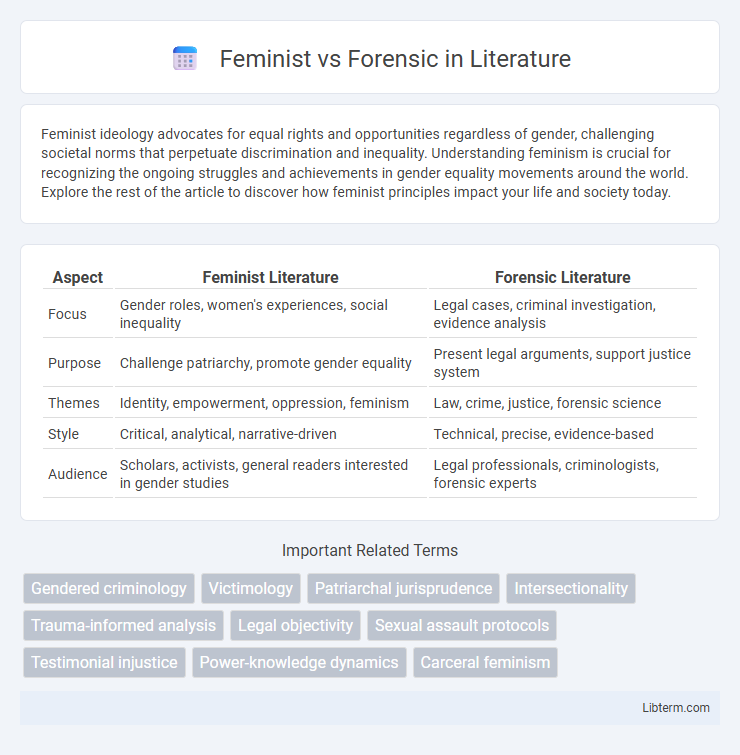Feminist ideology advocates for equal rights and opportunities regardless of gender, challenging societal norms that perpetuate discrimination and inequality. Understanding feminism is crucial for recognizing the ongoing struggles and achievements in gender equality movements around the world. Explore the rest of the article to discover how feminist principles impact your life and society today.
Table of Comparison
| Aspect | Feminist Literature | Forensic Literature |
|---|---|---|
| Focus | Gender roles, women's experiences, social inequality | Legal cases, criminal investigation, evidence analysis |
| Purpose | Challenge patriarchy, promote gender equality | Present legal arguments, support justice system |
| Themes | Identity, empowerment, oppression, feminism | Law, crime, justice, forensic science |
| Style | Critical, analytical, narrative-driven | Technical, precise, evidence-based |
| Audience | Scholars, activists, general readers interested in gender studies | Legal professionals, criminologists, forensic experts |
Understanding Feminist Perspectives
Feminist perspectives emphasize the analysis of power structures, gender inequalities, and social norms that shape women's experiences and identities. These viewpoints critique traditional forensic approaches by highlighting biases in legal systems, evidence interpretation, and victim representation. Understanding feminist perspectives enriches forensic science by advocating for more inclusive, equitable practices that address systemic gender disparities in criminal investigations and justice outcomes.
Defining Forensic Approaches
Forensic approaches focus on the application of scientific methods and legal principles to investigate and establish facts in criminal and civil cases. These approaches emphasize evidence collection, analysis, and presentation, ensuring accuracy and objectivity in judicial processes. In contrast to feminist approaches, forensic methods prioritize empirical data and procedural rigor over social critique or gender-focused perspectives.
Key Differences Between Feminist and Forensic Views
Feminist views emphasize gender equality and challenge traditional power structures, focusing on systemic biases and societal impacts on women, while forensic views prioritize objective evidence and legal procedures in criminal investigations. Feminist approaches critique the patriarchal underpinnings of legal systems, advocating for survivor-centered practices, whereas forensic perspectives rely on scientific methods like DNA analysis and crime scene examination to establish facts. The key difference lies in feminism's broader socio-political critique versus forensics' empirical and procedural focus within the justice system.
Historical Evolution of Feminist Theory
Feminist theory emerged in the late 19th and early 20th centuries, rooted in the fight for women's suffrage and gender equality, evolving through waves that addressed legal rights, cultural norms, and intersectionality. Forensic theory, primarily concerned with criminal justice and legal processes, developed separately but occasionally intersects with feminist theory in addressing issues like gender-based violence and legal reforms. The historical evolution of feminist theory showcases a shift from basic legal equality to complex analyses of power, identity, and systemic oppression, influencing various disciplines including law and criminal justice studies.
Development of Forensic Science and Methodology
The development of forensic science has revolutionized criminal investigations by incorporating advanced techniques such as DNA analysis, digital forensics, and trace evidence examination, greatly enhancing the accuracy and reliability of evidence collection and interpretation. Forensic methodology emphasizes scientific rigor, standardized protocols, and the integration of multidisciplinary approaches including chemistry, biology, and physics to solve crimes and support the legal system. Feminist critiques highlight the importance of addressing gender biases within forensic practices and advocate for more inclusive methodologies that consider social context and power dynamics in forensic analysis.
Intersection of Feminism and Forensics
The intersection of feminism and forensics highlights the critical role of gender-sensitive approaches in forensic science, ensuring equitable treatment and accuracy in investigations involving women and marginalized groups. Feminist perspectives challenge traditional forensic methodologies by addressing biases, advocating for survivor-centered practices in sexual violence cases, and emphasizing the social context of evidence. Integrating feminist theory into forensic practices enhances justice delivery by promoting inclusivity and recognizing the complex realities faced by diverse populations.
Gender Bias in Forensic Practices
Gender bias in forensic practices often leads to the marginalization of female victims and the reinforcement of patriarchal norms. Feminist critiques expose how traditional forensic methodologies may overlook or misinterpret evidence related to gendered violence, such as sexual assault or domestic abuse. Integrating feminist perspectives into forensic science promotes equitable treatment and improved accuracy in investigations involving gender-based crimes.
Feminist Critiques of Forensic Systems
Feminist critiques of forensic systems highlight the gender biases ingrained in legal and investigative processes, emphasizing how these systems often marginalize women's experiences and reinforce patriarchal power dynamics. Research reveals that forensic practices frequently overlook or misinterpret evidence related to sexual violence, resulting in inadequate justice for survivors. Advocates call for reforms that incorporate feminist perspectives to ensure more equitable and sensitive handling of cases involving gender-based violence.
Case Studies: Feminist vs Forensic Outcomes
Case studies comparing feminist and forensic approaches reveal distinct outcomes in addressing violence and justice. Feminist frameworks prioritize survivors' narratives and systemic gender inequalities, leading to transformative justice solutions that emphasize empowerment and social change. Forensic approaches focus on empirical evidence and legal standards, often resulting in outcomes centered on conviction and punishment within established judicial systems.
Future Trends: Integrating Feminist and Forensic Insights
Future trends in integrating feminist and forensic insights emphasize the development of interdisciplinary methodologies that address gender biases in legal investigations and evidence interpretation. Advances in forensic technology combined with feminist theories promote equitable justice frameworks by highlighting systemic inequalities and advocating for victim-centered approaches. This integration fosters more accurate, culturally sensitive forensic practices that enhance accountability and support marginalized populations in criminal justice systems.
Feminist Infographic

 libterm.com
libterm.com